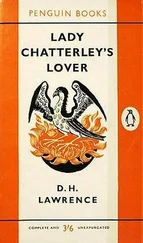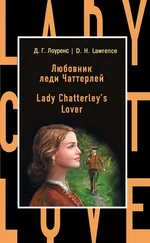He looked in wonder at Connie.
“No, no!” she said hastily. “Only that old friendship, quite simple, no love.”
“Then why should the fellow take the blame? If he’s had nothing out of you?”
“Some men are chivalrous and don’t only count what they get out of a woman,” said Hilda.
“One for me, eh? But who’s the johnny? [121] John, johnny — сленг. «любовник».
”
“A friend whom we’ve known since we were children in Scotland, an artist.”
“Duncan Forbes!” he said at once, for Connie had talked to him. “And how would you shift the blame on to him?”
“They could stay together in some hotel, or she could even stay in his apartment.”
“Seems to me like a lot of fuss for nothing,” he said.
“What else do you suggest?” said Hilda. “If your name appears, you will get no divorce from your wife, who is apparently quite an impossible person to be mixed up with.”
“All that!” he said grimly.
There was a long silence.
“We could go right away,” he said.
“There is no right away for Connie,” said Hilda. “Clifford is too well known.”
Again the silence of pure frustration.
“The world is what it is. If you want to live together without being persecuted, you will have to marry. To marry, you both have to be divorced. So how are you both going about it?”
He was silent for a long time.
“How are you going about it for us?” he said.
“We will see if Duncan will consent to figure as co-respondent: then we must get Clifford to divorce Connie: and you must go on with your divorce, and you must both keep apart till you are free.”
“Sounds like a lunatic asylum.”
“Possibly! And the world would look on you as lunatics: or worse.
“What is worse?”
“Criminals, I suppose.”
“Hope I can plunge in the dagger a few more times yet,” he said, grinning. Then he was silent, and angry.
“Well!” he said at last. “I agree to anything. The world is a raving idiot, and no man can kill it: though I’ll do my best. But you’re right. We must rescue ourselves as best we can.”
He looked in humiliation, anger, weariness and misery at Connie.
“Ma lass!” he said. “The world’s goin’ to put salt on thy tail.”
“Not if we don’t let it,” she said.
She minded this conniving against the world less than he did.
Duncan, when approached, also insisted on seeing the delinquent game-keeper, so there was a dinner, this time in his flat: the four of them. Duncan was a rather short, broad, dark-skinned, taciturn Hamlet of a fellow with straight black hair and a weird Celtic conceit of himself. His art was all tubes and valves and spirals and strange colours, ultra-modern, yet with a certain power, even a certain purity of form and tone: only Mellors thought it cruel and repellent. He did not venture to say so, for Duncan was almost insane on the point of his art: it was a personal cult, a personal religion with him.
They were looking at the pictures in the studio, and Duncan kept his smallish brown eyes on the other man. He wanted to hear what the game-keeper would say. He knew already Connie’s and Hilda’s opinions.
“It is like a pure bit of murder,” said Mellors at last; a speech Duncan by no means expected from a game-keeper.
“And who is murdered?” asked Hilda, rather coldly and sneeringly.
“Me! It murders all the bowels of compassion in a man.”
A wave of pure hate came out of the artist. He heard the note of dislike in the other man’s voice, and the note of contempt. And he himself loathed the mention of bowels of compassion. Sickly sentiment!
Mellors stood rather tall and thin, worn-looking, gazing with flickering detachment that was something like the dancing of a moth on the wing, at the pictures.
“Perhaps stupidity is murdered; sentimental stupidity,” sneered the artist.
“Do you think so? I think all these tubes and corrugated vibrations are stupid enough for anything, and pretty sentimental. They show a lot of self-pity and an awful lot of nervous self-opinion, seems to me.”
In another wave of hate the artist’s face looked yellow. But with a sort of silent hauteur he turned the pictures to the wall.
“I think we may go to the dining-room,” he said. And they trailed off, dismally.
After coffee, Duncan said:
“I don’t at all mind posing as the father of Connie’s child. But only on the condition that she’ll come and pose as a model for me. I’ve wanted her for years, and she’s always refused.” He uttered it with the dark finality of an inquisitor announcing an auto da fe.
“Ah!” said Mellors. “You only do it on condition, then?”
“Quite! I only do it on that condition.” The artist tried to put the utmost contempt of the other person into his speech. He put a little too much.
“Better have me as a model at the same time,” said Mellors. “Better do us in a group, Vulcan and Venus under the net of art. I used to be a blacksmith, before I was a game-keeper.”
“Thank you,” said the artist. “I don’t think Vulcan has a figure that interests me.”
“Not even if it was tubified and titivated up?”
There was no answer. The artist was too haughty for further words.
It was a dismal party, in which the artist henceforth steadily ignored the presence of the other man, and talked only briefly, as if the words were wrung out of the depths of his gloomy portentousness, to the women.
“You didn’t like him, but he’s better than that, really. He’s really kind,” Connie explained as they left.
“He’s a little black pup with a corrugated distemper,” said Mellors.
“No, he wasn’t nice today.”
“And will you go and be a model to him?”
“Oh, I don’t really mind any more. He won’t touch me. And I don’t mind anything, if it paves the way to a life together for you and me.”
“But he’ll only shit on you on canvas.”
“I don’t care. He’ll only be painting his own feelings for me, and I don’t mind if he does that. I wouldn’t have him touch me, not for anything. But if he thinks he can do anything with his owlish arty staring, let him stare. He can make as many empty tubes and corrugations out of me as he likes. It’s his funeral. He hated you for what you said: that his tubified art is sentimental and self-important. But of course it’s true.”
Dear Clifford, I am afraid what you foresaw has happened. I am really in love with another man, and do hope you will divorce me. I am staying at present with Duncan in his flat. I told you he was at Venice with us. I’m awfully unhappy for your sake: but do try to take it quietly. You don’t really need me any more, and I can’t bear to come back to Wragby. I’m awfully sorry. But do try to forgive me, and divorce me and find someone better. I’m not really the right person for you, I am too impatient and selfish, I suppose. But I can’t ever come back to live with you again. And I feel so frightfully sorry about it all, for your sake. But if you don’t let yourself get worked up, you’ll see you won’t mind so frightfully. You didn’t really care about me personally. So do forgive me and get rid of me.
Clifford was not inwardly surprised to get this letter. Inwardly, he had known for a long time she was leaving him. But he had absolutely refused any outward admission of it. Therefore, outwardly, it came as the most terrible blow and shock to him, He had kept the surface of his confidence in her quite serene.
And that is how we are, By strength of will we cut off our inner intuitive knowledge from admitted consciousness. This causes a state of dread, or apprehension, which makes the blow ten times worse when it does fall.
Читать дальше
Конец ознакомительного отрывка
Купить книгу
![Дэвид Лоуренс Lady Chatterley's Lover [С англо-русским словарем] обложка книги](/books/26613/devid-lourens-lady-chatterley-s-lover-s-anglo-cover.webp)
![Герберт Уэллс - The War of the Worlds [С англо-русским словарем]](/books/26611/gerbert-uells-the-war-of-the-worlds-s-anglo-thumb.webp)
![Джейн Остин - Sense and Sensibility [С англо-русским словарем]](/books/26612/dzhejn-ostin-sense-and-sensibility-s-anglo-thumb.webp)
![Джек Лондон - Hearts of Three [С англо-русским словарем]](/books/26615/dzhek-london-hearts-of-three-s-anglo-thumb.webp)
![Чарльз Диккенс - A Tale of Two Cities [С англо-русским словарем]](/books/26616/charlz-dikkens-a-tale-of-two-cities-s-anglo-thumb.webp)
![Коллектив авторов - Best Short Stories [С англо-русским словарем]](/books/26635/kollektiv-avtorov-best-short-stories-s-anglo-thumb.webp)
![Брэм Стокер - Dracula [С англо-русским словарем]](/books/26636/brem-stoker-dracula-s-anglo-russkim-slovarem-thumb.webp)





